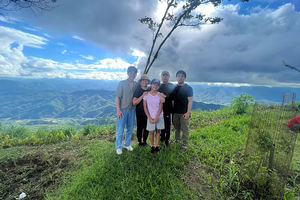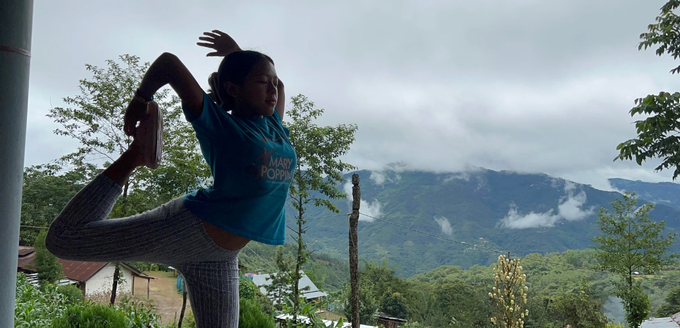
August 2023
SUFFERING IN SOLITUDE: A Reflection on Resting in the Midst of Suffering.
We embarked on an off-grid adventure that immersed us in the beauty of nature and soothing rain. We ventured into a serene paddy field, crossed a rustic bamboo bridge, and conquered the tallest mountain we saw. Our meals consisted of delectable, fresh organic vegetables, and homegrown poultry, fish, and meat. The purity of the air filled our lungs with delight. Each night we gathered around a crackling fire while the children joyfully played together with their newfound friends at Hope Children's Home. They all sang, danced, and enjoyed lively games of soccer, volleyball, and badminton together. And our children formed a deep affection for their loving grandmother.
For three weeks we were disconnected from the digital realm, bidding farewell to the internet's constant hum and hurry. Some people in such a peaceful place may have feared boredom, but the experience for us was far from mundane. This was a time of solitude, rest, and finding purpose within each empty hour. One of our sons reflected upon his life in America, acknowledging that despite having all he needed, he still experienced moments of boredom. However, this journey was a different kind of boredom—one that embraced solitude, enhanced rest, and filled each hour with meaning.
In these moments, we discovered the true essence of Sabbath—a time to give up the constant striving for usefulness and, instead, to find inner peace and solace in the simple act of resting.

SUFFERING AND CAPITALISTIC SPIRITUALITY: Placing our hope in the comforting presence
of THE Ultimate Comforter.
When we learn to desire less, we find solace in rest. Suffering often arises from wanting more than what is truly necessary. This connection between suffering and our materialistic mindset is particularly evident in the context of capitalist spirituality. In our pursuit to alleviate suffering, we often seek a life devoid of hardship. This mindset is prevalent in Western Christianity, which tends to prioritize a suffering-free existence. However, our family recently engaged in a conversation that emphasized Eastern spirituality in regard to suffering. In many Eastern Christian traditions, suffering is acknowledged as an integral part of the human journey. Instead of striving for victory over suffering, the focus lies in finding peace amidst it. As we witnessed the widespread suffering among our native people, and saw them living stoically with that suffering—rather than striving for a life free from suffering—we could see a major difference in the faith traditions of Western Christianity and Eastern Christianity. In both traditions, suffering is present in a person's social, economic, political, and spiritual lives. What is different are the responses: The avoidance of suffering in the West and the acceptance of suffering in the East.
Our native people are in dire need of compassion and comfort. Every day as we take a walk we are confronted with the suffering that pervades our surroundings. The streets bear the weight of tears and stories of immense struggles. The people need a street of mercy. In the West, our youth grapple with the scourge of drug addiction and its devastating consequences, while in the East young widows yearn for a glimmer of hope as they struggle to raise their children on their own.
However, amidst all of the suffering we see here, we are reminded that suffering is an essential part of our spiritual journey. Instead of fearing to suffer, we are called to embrace suffering because it is an inevitable part of life. We recognize that an existence free from all suffering is unattainable. Instead, we can learn to coexist with suffering, and place our hope in the comforting presence of the Ultimate Comforter.

UPWARD MOBILITY: The Pursuit of Rest and Contentment.
When we learn to desire less, we discover the true essence of rest. As our wants diminish, so do our worries. For individuals living in Silicon Valley, there is the constant race upward, striving to achieve more and to have more with each passing year. This pursuit of material upward mobility has become so deeply ingrained in the culture that rarely is the validity of that pursuit questioned.
However, there is great merit in exploring the alternative perspective—downward mobility. John 3:30 speaks of this, advocating a decrease in self-importance while allowing Christ's influence to increase. Similarly Paul in 2 Corinthians 12:9-10 emphasizes that God's strength is most evident in our weaknesses. Of course, downward mobility challenges the prevailing cultural norms in both the Bay Area and in India, where, in the latter case, social aspirations often mean climbing up the caste ladder. In contrast to either material gain or a gain in status, Sabbatical rest calls for contentment and embracing a simpler life with fewer distractions and desires.
During our sabbatical journey with my native people, we traveled many narrow and winding roads, symbolic of the path Christ calls upon us to walk. The narrow path serves as a metaphor for living a purposeful and intentional life, which leads to the most profound joy one can experience.

HIDDENNESS AND NOTHINGNESS: Embracing Humility and Finding Significance
As we surrender our desires for more possessions, more money, more power or more recognition, we shed the false trappings of the world. Eastern spirituality places great emphasis on the concept of reaching a state of "nothingness" as the ultimate goal. Paradoxically, in the West, it is in our quest to be seen, valued, and celebrated that results in frustration and anger. The fear of being unnoticed or of having less than we feel we should have eventually results in our lives being filled with stress and strife.
Consider the examples of Adam, Joseph, and Christ. Adam lived in a state of hiddenness, with everything provided for him and with his actions scarcely written about in the Bible. Similarly, Joseph's life was characterized by hiddenness: He may have performed mighty acts, but those mighty acts remained largely unrecorded. Even the writers of the Gospels overlooked the life of Joseph. Christ too embraced hiddenness. He descended from Heaven and obediently fulfilled the Will of His Father. The lives of Adam, Joseph, and Christ Jesus illustrate the profound wisdom in doing the Will of God, without considering a reward of recognition or worldly acclaim.
In the pursuit of spiritual growth, let all of us reflect on these profound insights: The spirituality of suffering; the pursuit of contentment through downward mobility; and the embrace of hiddenness and nothingness. By incorporating these ways of living into our daily lives, we can discover a deeper sense of peace, joy, and purpose.
